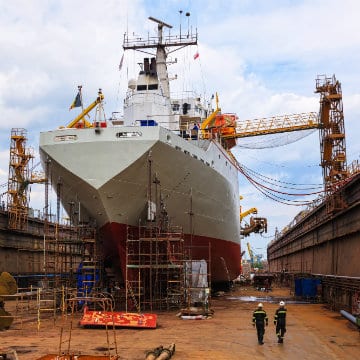Were you or a loved one injured while working as a longshoreman or harbor worker? You may be wondering about your options:
Our workers’ compensation lawyers can answer your concerns and help you get your benefits.
It takes a lot of hard work and cooperation to keep America’s commercial water vessels running smoothly. While seamen and crew members work together to ensure that goods and products arrive at their destination safely and promptly, there are a host of other maritime workers who help to build, maintain, and repair ships. Like virtually all other workers, employees who work in and around the navigable waters of the United States are eligible for benefits when they get injured on the job. However, unlike other workers, these employees have their own benefits system, known as the Longshore and Harbor Workers’ Compensation Act (LHWCA).
To learn more on financial compensation options for injured offshore workers, continue reading.
The Longshore and Harbor Workers’ Compensation Act differs from the standard workers’ compensation system. This Act is a federal law, which means claims must be made with the United States government through one of their 15 nationwide District Offices. Most other workers file workers’ compensation claims at the state level, and deal primarily with their state’s Workers’ Compensation Board and their employer’s insurance carrier.
Qualifying employees may be eligible for the following injury benefits under the LHWCA:
While injured longshore and harbor workers may be entitled to these benefits, not every worker receives the coverage they need and deserve. The process of applying for compensation is complicated, and the other side will have skilled lawyers who specialize in denying claims. For many injured maritime workers, it’s necessary to have your own legal counsel to guide you through the process.
This Act covers longshoremen and employees who work in harbors, docks, shipping terminals, and shipyards. Essentially, anyone who is involved with the construction, maintenance, construction, loading or unloading of a vessel is covered by the LHWCA when a work-related injury, illness, disability, or death occurs.
Specific job titles that are covered under this Act include:
Only employees who are actively involved in maritime work are covered under the LHWCA. For example, clerical or secretarial workers on docks and marinas would not be eligible for these benefits. Mechanics and shipbuilders for small recreational vessels are also excluded.
Any injury, illness, or disability which is directly related to your work environment is eligible for benefits under the Longshore and Harbor Workers’ Compensation Act, including:
These are just a few of the most common forms of compensable work disabilities, but any injury, illness, or impairment which occurs during the course of your work duties is eligible for benefits.
In order to file a claim under the Longshore and Harbor Workers’ Compensation Act, you must first file a written injury report with both your employer and the U.S. Department of Labor within 30 days of your injury, or within 30 days of becoming aware of your injury. For occupational illnesses, this deadline is extended from 30 days to 1 year. You must also provide medical evidence which establishes a direct link between your condition and your work environment.
Be aware that many injured longshore and harbor workers have a hard time recover the benefits they deserve. If you’d like to find out more about your rights after suffering a maritime work injury, contact one of our maritime injury lawyers today for a free consultation.
Also See: How Maritime Law Applies To Offshore & Longshoremen Worker Injuries

 info@legalherald.com
info@legalherald.com